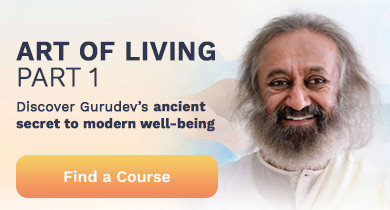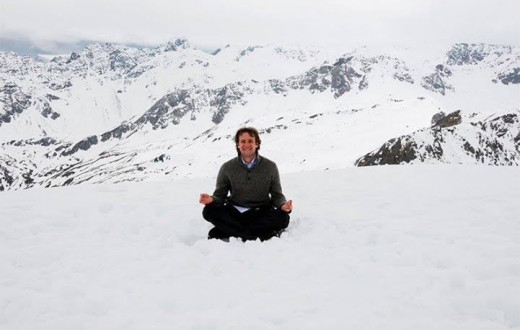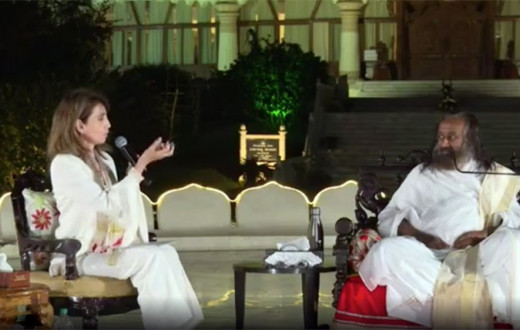
During meditation, you may often find the mind going very deep into itself, but then something brings it out. Thoughts come, and the depth is lost. However, with practice and consistency over time, this changes.
Thoughts arise in so many ways and take you for a ride. They may be desires, ambitions, expectations, doubts, unpleasant memories, feverishness, worries, or other concerns.
Worries and concerns
You are bothered if you have things that you want and if you don't have them. For example, if you have money, you are worried about what you should do with it and whether to invest.
If you invest, you may be worried about whether your money is growing or not, or you may feel anxious about stock market fluctuations.
If you don't have money, you are also concerned.
“'Liberation” is that total freedom in which you are not bothered or concerned when things are there, and you are not bothered even if they are not there.
Look back at the times when you worried. Just imagine how you were five years ago on a particular day:
- “Will I get the job?”
- “Will I get well?”
- “Will I be humiliated in class for not doing the assignment?”
It was a big deal at the time, but now you really don't remember your past worries. Every time you worry, you think it is fresh and new. Just as all those previous worries are now stale and have passed, you will find that this present worry is also stale. What makes a worry stay with you is your illusion that you are going to live forever.
Desires
Desire simply means that the present moment is not right, which causes tension in the mind. Every desire causes feverishness. In this state, meditation is far away from happening. You may sit with your eyes closed, but desires and thoughts keep arising, and you fool yourself into thinking you are meditating—in fact, you are daydreaming!
As long as some desires linger in your mind, you cannot be at total rest.
“You cannot get into yoga (union with the Self) unless you drop the desires or hankerings within” - Bhagavad Gita
Every desire or ambition is like a particle of sand in your eyes. You can neither shut your eyes nor keep them open with a sand particle inside—it is uncomfortable either way.
Dispassion is removing this particle of sand so that you can freely open and shut your eyes. Another approach is to expand your desire, and then also it won’t bother you. Only a tiny sand particle irritates your eye—a big stone or a rock can never get into your eyes.
You have no control over your desires.
Even if you say, "Oh, desire is the cause of misery. I shouldn't have desires. When will I be free of desires?" that itself is another desire! So, as they come up, recognize them and let go. This process is called Sanyas (renunciation).
When you observe all desires as they arise in you and are centered, then nothing can shake you or take you away from your center.
Editor’s note: You may enjoy reading Gurudev’s article, I Want Nothing, I Do Nothing, I Am Nothing, the three golden keys to meditation related to desires.
Ambitions
As long as you hold onto some kind of plan, your mind does not settle.
Have you noticed that you do not sleep deeply when you go to bed feeling restless, agitated, or having desires? Very ambitious people cannot sleep deeply because their minds are not free. Though plans or ambitions do not appear to be there for a while in the mind as you go to sleep, they are actually still there.
You will be able to rest if you simply let go of everything before going to sleep. Similarly, when you want to sit for meditation, let go of everything.
Doubts
Have you noticed doubts are always about something positive?
- When you are happy, you doubt, “Am I really happy?”
- If someone tells you they love you, you say, “Really? Are you sure?”
We never doubt anything negative in life. You never doubt someone else's anger or your own. If someone tells you they hate you, you don't doubt it.
But if you can doubt people's negativity, you come close to reality.
With this awareness, when you increase the subtle energy (prana) in your body, doubts will disappear, your mind will be clearer, and you will feel less confused.
Meditation is the only way you can transcend negative thoughts. Then, positive thoughts will come spontaneously and automatically.
Unpleasant memories
Your memory can make you either sad or enlightened.
Your mind is churning so often with unpleasant memories.
"He said this and that". "She was so arrogant". "They did this to me".
Meditation can bring about a shift in your memory, allowing you to let go of the trivial and recognize your infinite nature.
Let go of thoughts and desires
Streams of thoughts are always passing through your mind. But you catch hold of the thoughts and do not allow them to go easily like a record needle getting stuck in one groove. Let the thoughts go. Feel that they are not yours. Sorrow comes from getting stuck in one thought or desire. Meditation happens when thoughts subside.
You meditate and calm your mind, then go on with other activities. It's not easy to keep yourself undisturbed, but it'll happen as you keep doing the practices regularly. Then it'll become easy. Let go of all the effort to stop thoughts, concentrate, or contemplate.
Transcend your thoughts with meditation
Meditation is letting go of anger, past events, and all the planning for the future. Meditation is accepting this moment and living every moment with total depth and presence.
Just this understanding and a few days of continuous meditation practice can change the quality of your life.
The rest in meditation is deeper than the deepest sleep because, in meditation, you transcend all thoughts and desires. This brings such coolness to the brain, and it is like overhauling the whole body-mind complex.
*************************************************************************************************
Editor’s note:
SKY Breath Meditation
Millions around the world have benefitted from SKY Breath Meditation, a program created by Gurudev Sri Sri Ravi Shankar, which improves physical and mental health. SKY practitioners have reported more optimism, joy, and life satisfaction while experiencing less stress, better sleep, healthier blood pressure, improved immunity, and overall well-being. Researchers have also found SKY reduces both clinical and non-clinical depression and anxiety, as well as helps overcome trauma and addictive behaviors.
Learn SKY on the Art of Living Part 1 course. Register on our meditation app.
Related articles
Meditation Classes Near Me for Peace of Mind, Body, and Heart
How to Meditate Properly: 5 Tips To Make You an Expert Now
Learn the Basics of Meditation to Begin Your Long-Lasting Practice
Discover How Breath Meditation Can Give Greater Clarity of Mind Now
How to Meditate: The First and Last Guide You’ll Ever Need
The Best Meditation Positions for Your Body and Practice
Visualization and Meditation: Are They the Same Thing?
On Your Last Nerve? Try a Guided Meditation for Anxiety Relief
Body Scan Meditation for Deep Relaxation and Nourishment
Meditation for Kids Can Help With Focus, Sleep, and Stress!






























